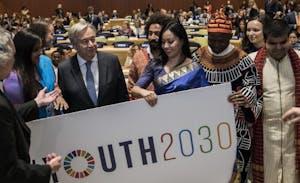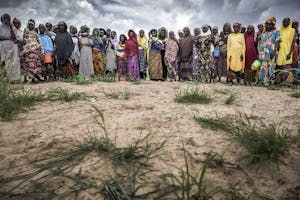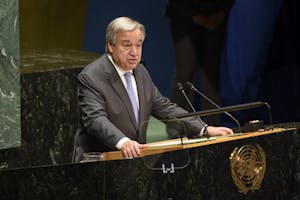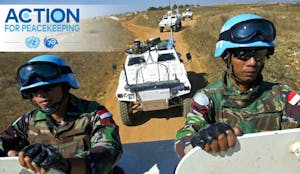With the world up against a growing list of problems without borders – from brutal conflicts to emerging health threats to rising hunger – the start of a new session of the United Nations General Assembly (UNGA) provided a crucial forum for advancing progress for everyone, everywhere.
As Secretary-General António Guterres said in his opening address to world leaders, despite falling levels of trust in global cooperation, “there is no way forward but collective, common-sense action for the common good.”
Here are nine key stories from UNGA that demonstrate real action toward a future where no one is left behind.
1. The First-Ever UN Youth Strategy Launches
While young people are the largest and most connected generation, they face enormous challenges accessing education, work, and health care. At UNGA, the UN launched a new strategy dedicated to giving young people opportunities to determine their own futures.
As part of this effort, UNICEF announced Generation Unlimited, a multi-stakeholder initiative that aims to ensure all young people are in school, training, or employment by 2030.
“Today marks the beginning of a reset and reorientation of the UN system’s commitment to ensure that young people are not only heard, but understood; not only engaged, but empowered; and not only supporting, but leading…” – Jayathma Wickramanayake, Secretary-General’s Envoy on Youth.

2. First-Ever High-Level Meeting on TB Steps Up Global Action
Although tuberculosis (TB) is the world’s deadliest infection – responsible for 1.6 million deaths in 2017 – it faces immense gaps in funding. At the first-ever High-Level Meeting on TB, world leaders agreed to step up the global fight against TB, including efforts to raise funds for TB programs and research and development.
“TB knows no borders. Everyone is at risk. But it thrives where there is poverty, malnutrition or conflict.” – Dr Tedros Adhanom Ghebreyesus, Director-General of the World Health Organization
3. Tech Giants and the UN Harness AI to Prevent Famine
With 124 million people living in crisis levels of food insecurity, urgent humanitarian assistance is vital for survival. Tech giants – Google, Microsoft Corp., and Amazon Web services – in partnership with the UN and international organizations, launched the Famine Action Mechanism (FAM) – the first global mechanism dedicated to using the predictive power of artificial intelligence to prevent future famines.
“Artificial intelligence and machine learning hold huge promise for forecasting and detecting early signs of food shortages, like crop failures, droughts, natural disasters, and conflicts “- Brad Smith, President of Microsoft.

4. World Benchmarking Alliance Sets the Mark for Corporate Sustainability
We can’t realize the Sustainable Development Goals without the private sector, but how do we measure their contributions and incentivize action? The World Benchmarking Alliance (WBA), launched by Aviva, the Index Initiative, and the UN Foundation, aims to answer this important question. Through a set of publicly available benchmarks, WBA will assess how companies are doing on their contributions to the SDGs and inspire a competitive race to the top.
“The real value of benchmarks is that they will empower society to make decisions that are in line with its values, which will ultimately create demand for corporate responsibility.” – Gerbrand Haverkamp, Executive Director of the World Benchmarking Alliance
5. The Secretary-General Launches a New Financing Strategy for the SDGs
Achieving the SDGs will require major investments and substantial changes in the way we do business and make policy. To overcome obstacles and unlock opportunities in financing sustainable development, Secretary-General António Guterres announced a new three-year roadmap of actions and initiatives with the UN, governments, businesses, and financial institutions.
“By investing in the Sustainable Development Goals, we invest in the future, ensuring a world in which we strive for peace, stability and prosperity that leaves no one behind.” – Secretary-General António Guterres

6. Countries Seek Record Investments in “Data to End Hunger”
To support the world’s 500 million smallholder farmers, a coalition of donors and low-income countries pledged to seek significant funding for agriculture data across 50 countries in Africa, Asia, and Latin America by 2030. The commitment is one of the largest ever investments in collecting data for agricultural development and sets the stage for more targeted solutions to hunger challenges.
“Kenya welcomes the cooperation shown today, to work with 50 countries in supporting millions of smallholder farmers,” – Hon. William Ruto, Deputy President of Kenya.
7. The Action for Peacekeeping Initiative Gains Crucial Backing
As conflicts become increasingly complex, peacekeeping missions deployed across the globe must adapt. The Action for Peacekeeping initiative, launched by the Secretary-General in March, asks all member states to revitalize peacekeeping through improvements to operations, increased participation of women, strengthened partnerships with governments, and more. At UNGA, many countries – now totaling 145 UN member states – expressed their commitment to the initiative.
“United Nations peacekeeping is a concrete example of multilateralism at work. It demonstrates how the global community can address some of today’s most complex and dangerous issues with a mixture of creativity and pragmatism.” – Secretary-General António Guterres

8. Financing for Education Gains Momentum
Access to quality education for all (SDG 4) received a major boost from new supporters of the International Finance Facility for Education (IFFEd), which included Norway, Canada, Denmark, the United Kingdom, the United Arab Emirates, the Netherlands, and others. Through new forms of financing, the facility aims to unlock $10 billion in new funding to help low- and middle-income countries grow and improve their education systems.
“I think we have proved that this facility is urgently needed, that it’s complementary to what exists in education, that it’s feasible and can help bridge the [education financing] gap,” – Gordon Brown, former U.K. Prime Minister and Chair of the Education Commission.
9. Partners Lead a New Challenge to Combat AMR
To counter the emerging global threat of antimicrobial resistance (AMR), the U.S. Centers for Disease Control, the UN Foundation, the Bill & Melinda Gates Foundation, and Wellcome Trust co-hosted the launch of an ambitious year-long initiative aimed at tackling AMR. The challenge will encourage organizations and industries around the world to work together by creating programs that improve antibiotic use, sharing data on AMR, and more.
“We’ve had some success fighting antibiotic resistance but, if we don’t all act fast together, we will see global progress quickly unravel.” – U.S. Secretary of Health and Human Service Secretary Alex Azar



 View All Blog Posts
View All Blog Posts


